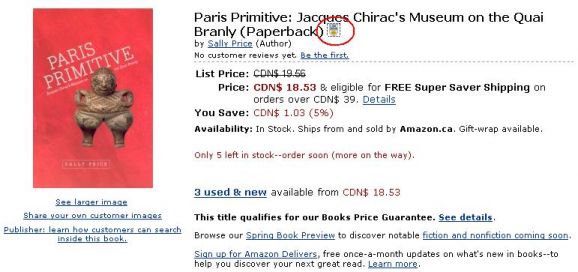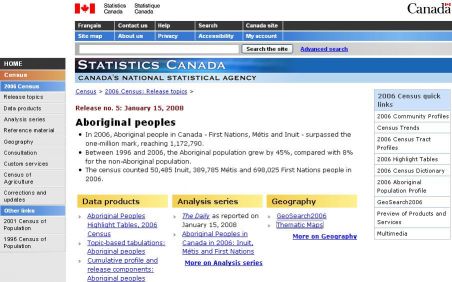March 28th, 2008 by Susan Atkey | No Comments »
Earlier today I posted about new research on the domestication of maize. I heard about this news via an alerting service called EurekAlerts! from the American Academy for the Advancement of Science (AAAS).
EurekAlerts! is a global news service through which organizations engaged in research can bring their news to the media. They offer RSS Feeds (more on that in a moment) in a number of subject areas, including Archaeology.
RSS Feeds offer a quick and easy way to keep up-to-date in your area of research. By subscribing to the RSS Feed using a feed reader such as Bloglines or Google Reader, you can be alerted to any new content that is posted. To find feeds, look for the orange RSS icons on your favorite news source, blog, or ejournal:
 or
or  or
or 
You add a feed to your reader by clicking on the RSS icon and then copying & pasting the URL into the RSS reader. Anytime new content is added, your Reader will be updated.
For a quick introduction to RSS Feeds and Readers, I highly recommend this 4-minute video “RSS in Plain English“:
(Thanks to the good folks at Common Craft for their Explanation in Plain English series!)
Posted in Tips and Tricks | No Comments »
March 4th, 2008 by Susan Atkey | No Comments »
Have you ever found the perfect book at Amazon and wanted to quickly check if it was available at UBC Library? Do you wish you could find a copy of that great journal article cited on a webpage, without having to go into the Library catalogue on another webpage?
LibX is a browser plugin that provides direct access to the UBC Library’s resources from a webpage in two ways.
(1): It creates a searchbox – right in your browser toolbar – that allows you to search the UBC Catalogue, Journals, Google Scholar or WorldCat simply by highlighting or dragging-and-dropping the text. The search box is placed directly below the address bar in your browser, like this:

(2) LibX also places a tiny UBC icon 
on pages displaying citation information, such as online book sellers, abstacts, or bibliographies. Clicking the icon takes you to related library offerings. For instance, on book pages at Amazon, the icon will link to the book’s entry in the UBC Library catalogue. The icon is displayed next to the book title, like this:

The icon is displayed at Google, Yahoo! Search, the NY Times Book Review, and other pages.
For more information and to download the plugin, go to: http://www.library.ubc.ca/labs/libx/
Posted in Tips and Tricks, What's New? | No Comments »
March 3rd, 2008 by Susan Atkey | 1 Comment »
Did you know that we have online access to most North American Ph.D dissertations published post-1997? We do, through a database called Proquest Dissertations and Theses. You can access the database from the list of indexes and databases off the library home page (under the eresources tab, in the blue menu bar at the top).
Thanks to a handy search widget that ProQuest has created, you can give it a try right now from here. Just type your keywords into the box below:
function proQuestSearchGo(){
var url=”http://proquest.umi.com/pqdweb?RQT=305&FT=1&DBId=15119&SQ=”;
var searchInputEl = document.getElementById(“proQuestSearchInput”);
document.location=url + encodeURIComponent(searchInputEl.value);
}
function handleKeyPress(e,form){
var key=e.keyCode || e.which;
if (key==13){
proQuestSearchGo();
}
}
I’ve added the widget to the Anthropology Subject Guide, in the section on theses and dissertations. Just look for the ProQuest search box, and enter your search terms.
(Remember that if you’re off-campus, you’ll need to authenticate using VPN or the proxy so that the database knows you’re from UBC – Contact me if you need help.)
Posted in Electronic Resources, Tips and Tricks | 1 Comment »
January 15th, 2008 by Susan Atkey | No Comments »

Data from the 2006 Census on Aborginal people (First Nations, Métis and Inuit) in Canada was released today.
Some of the highlights include:
- In 2006, Aboriginal people in Canada surpassed the one-million mark, reaching 1,172,790.
- Between 1996 and 2006, the Aboriginal population grew by 45%, compared with 8% for the non-Aboriginal population.
- The census counted 50,485 Inuit, 389,785 Métis and 698,025 First Nations people in 2006.
There are a number of ways to access this data. Start with the announcement page at http://www12.statcan.ca/english/census06/release/Aboriginal.cfm.
From there, data is organized into three broad categories: Data products, Analysis series, and Geography.
Using the census data can be challenging. If you need help finding the information you need, please come to the Koerner Library Reference desk.
Posted in Tips and Tricks | No Comments »
December 5th, 2007 by Susan Atkey | No Comments »
The exam period runs from Dec 4 – 18 – check the Student Services portal for a list of Anthropology exam times and locations.
Did you know that the AMS has an exam database with final exams from a variety of undergraduate and graduate courses? Studying from these examples can be an excellent way to prepare and supplement your course knowledge. Select ANTH from the dropdown menu on the AMS Exam Database website to see what is available for Anthropology exams.
Good luck to all on your finals!
Posted in Tips and Tricks | No Comments »
April 13th, 2007 by Susan Atkey | No Comments »
The final exam period runs from April 16-30 – check the Student Services portal for a list of Anthropology exam times and locations.
Did you know that the AMS has an exam database with final exams from a variety of undergraduate and graduate courses? Studying from these examples can be an excellent way to prepare and supplement your course knowledge. Select ANTH from the dropdown menu on the AMS Exam Database website to see what is available for Anthropology exams.
Good luck to all on your finals!
Posted in Tips and Tricks | No Comments »
![]() or
or ![]() or
or ![]()



